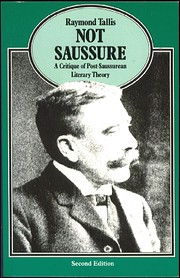

Carregue numa fotografia para ir para os Livros Google.
|
A carregar... Not Saussure: A Critique of Post-Saussurean Literary Theorypor Raymond Tallis
 Nenhum(a) Ainda não há conversas na Discussão sobre este livro. sem críticas | adicionar uma crítica
This work subjects the fundamental ideas of Derrida, Lacan, Barthes and their followers to an examination and demonstrates the baselessness of post-Saussurean claims about the relations between language, reality and self. Não foram encontradas descrições de bibliotecas. |
Current DiscussionsNenhum(a)
 Google Books — A carregar... Google Books — A carregar...GénerosSistema Decimal de Melvil (DDC)801.95Literature By Topic Literary Theory Literary theory and criticismClassificação da Biblioteca do Congresso dos EUA (LCC)AvaliaçãoMédia: (3.83) (3.83)
É você?Torne-se num Autor LibraryThing. |
||||||||||||||||||||||||||||||||||||||||||||||||||||||||||||||||||||||||||||||||||||||||||||||||||||||||||||||||||||||||
Nonetheless, there are some lingering things about this book that I found interesting. The first is its critique of certain strands of structuralism and post-structuralism, represented in particular by Roland Barthes, Jacques Derrida, and Jacques Lacan. Tallis charges these thinkers and the derivative theories they have inspired with over-emphasizing the importance of language over reality. The result, Tallis argues, is a kind of linguistic idealism, a conclusion with which I largely have to agree.
A second aspect of the book that I find of continuing interest is its refutation of realism as a "naive" mode of literature that assumes an equally naive view of language as the "mirror" of the world. Why am I interested in this subject? Because it was exactly, almost word for word, the focus of my doctoral dissertation! Unlike Tallis, I thought that this tendency to denigrate realism to be characteristic of the more derivative postmodernists rather than its more sophisticated practitioners. After all, Barthes may have lauded authors like Proust and Mallarmé for their "writerly" qualities, but the authors he analyzed most deeply in this respect were the classicist playwright Jean Racine (On Racine, 1963) and the French realist Honoré de Balzac (S/Z, 1970).
Tallis, however, makes the rather dubious case that the denigration of realist fiction is a direct result of the linguistic idealism that once ruled postmodern theory. At one point he angrily points out that, against the critical mythology, there is no evidence that a naive, mirror-like view of language influenced literary realism - but the fact is, there is no evidence presented by Tallis that Lacanian or Derridean theories of the sign produced anti-realist writing either. In fact, it's not even clear what "anti-realist" writing is, apart from a couple of lame examples from Alain Robbe-Grillet. What about, say, Umberto Eco, or Salman Rushdie, writers that were firmly on the rise at the time of the work?
Tallis's complaints in this regard are particularly strange given that the 1980s saw the return of the historical novel as the dominant mode of postmodern fiction. That is to say, the domain of empirical reality did, in fact, make an enormous comeback in the area of literary fiction. It was aided in this respect by the historicism made possible by another of the post-structuralist theorists, Michel Foucault, a thinker who did insist upon the importance of facts and reality, but who only rates a single mention in Not Saussure.
Tallis dedicates two substantial chapters to take-downs of Lacan's essay on the mirror stage and Derrida's Of Grammatology. Tallis's critical approach is rather like that of a bulldog: he sees an error or an inconsistency, and he latches onto it and doesn't let go. That's fine. These two pieces of writing are ripe for criticism anyway, but I do have problems with Tallis's methodology for two reasons.
The first is that it lacks historical sense. These two works of criticism have many errors and problems, but Tallis seems unable to acknowledge the bigger picture of what made them important to a particular time and place. It's like Locke's famous idea of the "tabula rasa" - yes, it's wrong, but understanding its subversive influence on seventeenth-century political and religious structures is its enduring value, and that is why it should still be read and appreciated. The same thing goes for these two texts, which Tallis looks upon as so much intellectual excrement.
The second has to do with Lacan, who is my current focus of research. Tallis refers only to two texts by Lacan - one on the mirror stage (from 1949), the other "The Function and Field of Speech and Language in Psychoanalysis" (1953). Lacan died in 1981, and in the intervening years he drastically reworked his ideas in ways that addressed and even transcended many of Tallis's criticisms, especially with regard to the question of the "real." I realize that many of Lacan's works were not available in translation in 1988, but certainly Seminar XI, in which this process of rethinking was already well under way, was available. One need only look at Tallis's book alongside, say, David Macey's Lacan in Contexts, also published in 1988, to see how unbelievably shallow Tallis's reading of Lacan really is.
To conclude, then, Not Saussure is a historical curiosity that attacks an era of criticism that is now largely a thing of the past anyway. Yes, Derrida and Lacan are still referenced in the humanities, but almost never through a framework of linguistic idealism that was prevalent in the 1980s. The ultimate problem I have with Tallis is that he is a exemplar of the kind of person who thinks that just because he is right about some things, he is right about everything. There is a self-righteous smugness and arrogance about his writing and criticism that I really loathe. Sure, Raymond, you may have a point sometimes, but you are transparently a self-regarding blowhard. (